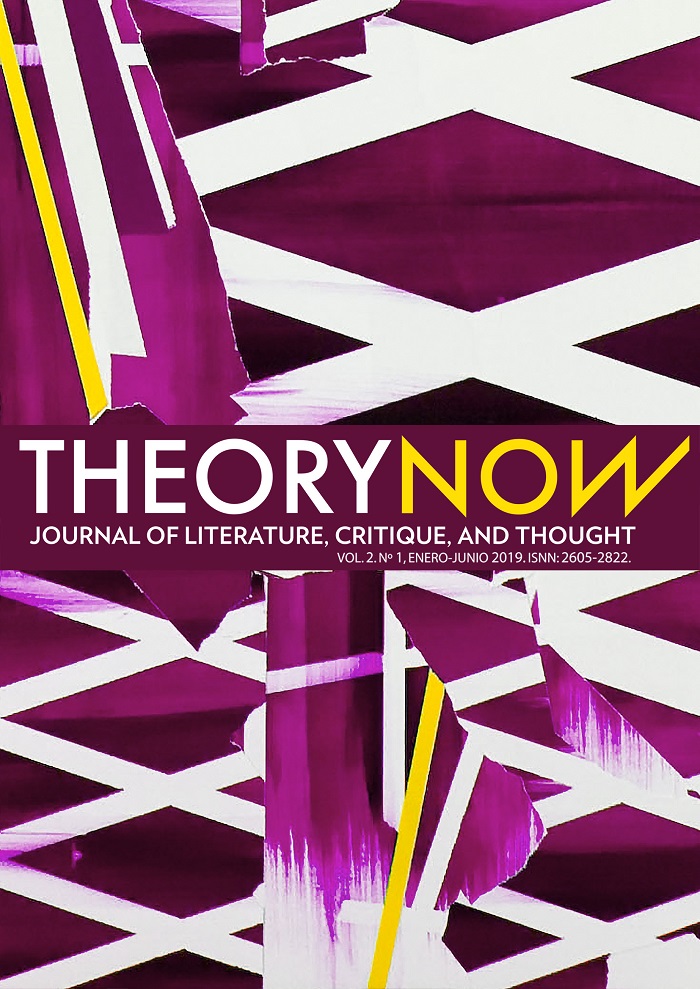“Exiliado de toda gregariedad”: amor profano, poética e imaginación política en Barthes y Agamben
DOI:
https://doi.org/10.30827/tnj.v2i1.8522Palabras clave:
Amor, Teoría literaria, Agamben, Barthes, Imaginación, Postsecular, Homo sacer, PoesíaResumen
El presente artículo despliega el concepto literario y filosófico de “amor profano” siguiendo la yuxtaposición, por una parte, del concepto de amor singular de Giorgio Agamben y su proyecto político y poético de profanación y, por otra parte, las nociones dispersas y figurativas de amor presentes en la obra de Roland Barthes Fragmentos de un discurso amoroso. El presente trabajo se abre con una crítica del estado discursivo del amor hoy en día y su relación con la política y el poder. Siguiendo la idea barthesiana de lo obsceno y las nociones agambenianas de profanación y exposición, el presente artículo considera que el amor debería pensarse como una experiencia de la pasividad que sucede en el encuentro y el roce de dos singularidades separadas. Tal y como se defiende en el presente trabajo, este proceso se lleva a cabo mediante la imaginación, y por tanto se piensa en relación con la imaginación política y poética. El presente artículo concibe por tanto la figura célebremente pesimista del homo sacer –el hombre abandonado– en nuevos términos, al sostener que el amante, como participante en una experiencia radical de pasividad y exposición, puede pensarse también como un ser abandonado, ofreciendo así una perspectiva afirmativa sobre el pensamiento político de Agamben.Descargas
Citas
Agamben, Giorgio. The Coming Community. Minneapolis: University of Minnesota Press, 2007.
_______. Homo Sacer: Sovereign Power and Bare Life. Stanford, Calif: Stanford University Press, 1998.
_______. The Idea of Prose. Albany: State University of New York, 1985.
_______. Nymphs. London: Seagull, 2013.
_______. Nudities. Stanford: Stanford California Press, 2011.
_______.The Open: Man and Animal. Stanford, California: Stanford University Press, 2004.
_______. Potentialities: Collected Essays in Philosophy. Stanford, Cal: Stanford University Press, 1999.
_______. Profanations. New York: Zone Books, 2015.
_______. Remnants of Auschwitz: The Witness and the Archive. New York: Zone Books, 1999a.
_______. The Adventure. Cambridge, Massachusetts : The MIT Press, 2018.
_______. The Church and the Kingdom. London: Seagull, 2012.
_______. The End of the Poem: Studies in Poetics. Stanford, Calif: Stanford University Press, 1999.
_______. The Fire and the Tale. Stanford: Stanford University Press, 2017.
_______. The Idea of Prose. N.Y: State University of New York press, 1995.
_______. The Man Without Content. Stanford, Calif: Stanford University Press, 2008.
_______. The Use of Bodies. Stanford, Calif: Stanford University Press, 2015a.
Ahmed, Sara. The Cultural Politics of Emotion. Edinburgh: Edinburgh University Press, 2014.
Alter, Robert. “The Garden of Metaphor”. The Art of Biblical Poetry, New York: Basic Books, 2011, pp. 185-203.
Badiou, Alain, Nicolas Truong, and Peter R. Bush. In Praise of Love. New York: New Press, 2012.
Barthes, Roland. A Lover’s Discourse: Fragments. London: Penguin Books, 1977.
Belsey, Catherine. Desire: Love Stories in Western Culture. Oxford: Blackwell, 1994.
Cadava, Eduardo and Cortes-Rocca, Paola. “Notes on Love and Photography”. October, vol. 116, Spring 2006, 3-34.
Graeber, David and Wengrow, David. “How to Change the Course of Human History”. https://www.eurozine.com/change-course-human-history/
Heath, Stephan. “Barthes on Love”. SubStance, Vol. 11/12, Vol. 11, no. 4 - Vol. 12, no. 1, Issue 37-38, 1982/1983, 100-106.
Illouz, Eva. Cold intimacies the making of emotional capitalism. Cambridge: Polity 2017.
______. Why love hurts: a sociological explanation. Cambridge: Polity, 2015.
Jacobson, Roman (1960), “Closing Statements: Linguistics and Poetics". Style In Language, edited by Thomas A. Sebeok, Cambridge Massachusetts, MIT Press, 1960, pp. 350–377.
Nancy, Jean-Luc, and Peter Connor. The Inoperative Community. Minneapolis, Minn: University of Minnesota Press, 1991.
Parsley, Connal. “'a Particular Fetishism': Love, Law and the Image in Agamben”. Giorgio Agamben: Legal, Political and Philosophical Perspectives, edited by Frost, Tom, New-York: Routledge, 2013, pp. 31-53.
Plato. The Symposioum. Project Gutenberg, internet source, http://www.gutenberg.org/files/1600/1600-h/1600-h.htm.
Prozorov, Sergei. Agamben and Politics: A Critical Introduction. Edinburgh: Edinburgh Univ. Press, 2014.
Solomon, Robert C. “A Lover’s Reply (To Roland Barthes’ A Lover’s Discourse)”. Philosophy and Desire, edited by Silverman, Hugh J., New York: Routledge, 2000, pp. 143-158.
Unger, Steven. “The Professor of Desire”. Yale French Studies, No. 63, 1982, 80-97.
Zamir, Tzachi. Double Vision: Moral Philosophy and Shakespearean Drama. Princeton: Princeton University Press, 2012.
Whyte, Jessica S. Catastrophe and Redemption: The Political Thought of Giorgio Agamben. Albany: SUNY Press, 2013.
Wolfreys, Julian. “Face to Face with Agamben; or, the Other in Love”. The Work of Giorgio Agamben: Law, Literature, Life, edited by Justin Clemens, Nicholas Heron and Alex Murray, Edinburgh: Edinburgh University Press, 2008, pp. 149-163.
Descargas
Publicado
Cómo citar
Número
Sección
Licencia
Theory Now Journal of Literature, Critique, and Thought es una publicación de acceso abierto e inmediato totalmente gratuita, tanto para lectorxs como para autorxs. Lxs autorxs no pagan ningún tipo de tasa por el proceso editorial de sus artículos. Permitimos la lectura, descarga, copia, distribución, impresión, búsqueda, enlace o reutilización con fines no comerciales de todos los trabajos publicados, siempre que se citen la autoría, la revista y el órgano editor. Todo material intelectual publicado en esta revista se encuentra protegido con una licencia de Creative Commons Reconocimiento-NoComercial .
Recomendamos encarecidamente la difusión de los artículos en redes sociales (Facebook, Twitter, LinkedIn, etc.) y científicas (ResearchGate, Academia.edu, etc.), repositorios institucionales universitarios y otros repositorios públicos, blogs y webs personales o institucionales, Google Scholar, ORCID, ResearchID, ScopusID, etc. En cualquier caso, la propiedad intelectual de los artículos y los posibles derechos económicos derivados de ellos son exclusivamente de sus autores.













